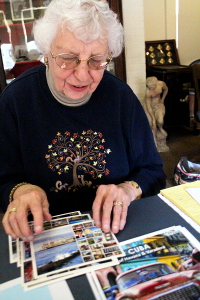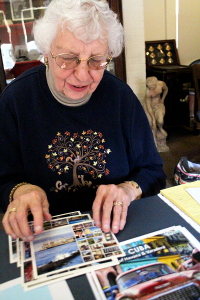 Cuba has been off-limits for most American travelers since the 1959 revolution that brought the late Fidel Castro to power, but one local woman took advantage of the nascent thaw between the two nations and visited Havana in October.
Cuba has been off-limits for most American travelers since the 1959 revolution that brought the late Fidel Castro to power, but one local woman took advantage of the nascent thaw between the two nations and visited Havana in October.

she brought back from a
recent trip to Cuba. (Photo
by Eric Crump/H-F
Chronicle)
Relatively few Americans have been able to travel to Cuba for the past six decades, after the coup led by the late Fidel Castro in 1959 drove a political wedge between the two countries.
The U.S. government opposed Castro’s communist dictatorship, but after he yielded power in 2008 to his brother, Raul, the country and its relationship with the U.S. began to slowly improve.
Now that the long embargo is being relaxed a bit, there are new opportunities for U.S. citizens to see the island nation.
One local woman already leaped at the chance.
Karen Smith of Glenwood, a longtime volunteer at the Homewood Historical Society, participated in a tour that went to Cuba Oct. 12 to 19. She signed up in April to ensure she would have a place. The first commercial U.S. flight to Cuba occurred at the end of August.
“People from all over the world have been allowed to go to Cuba for years,” she said, noting that she encountered a number of visitors from Europe and Canada while there.
Tourism is still not allowed for Americans, according to the U.S. State Department, but the stated mission of the tour was people-to-people education, which is.
And the trip was an education, Smith said.
“I’d heard about Cuban culture — the music, colorful clothes and classic cars — and I knew a little about the revolution,” she said.
Her visit filled in the shape and detail of Cuban culture for her.
She found that some common conceptions about Cuba are true. There really are many classic American-made cars from before the revolution that are still on the streets, most operating as taxi cabs.
Many of those cars were owned by wealthy Americans who frequented the casinos in Cuba prior to the revolution. When the coup began, Americans left the island quickly, often abandoning their cars.
With the country cut off from the U.S. auto industry, Cubans quickly became master mechanics and parts fabricators, she said.
Although Chevrolets seemed to be the most common make, Smith took one cab ride in a 1954 Mercury.
Another thing she noticed was the apparent health of the people. She learned the island is about 80 percent farmland, and there are no U.S. fast food chains there to compete with healthier options.
“They eat vegetables like crazy,” she said, noting that she saw almost no one who was either obese or emaciated.
Like the cars, much of Cuba’s economy and infrastructure are stuck in the mid-20th century. Smith said the group enjoyed a tour of a cigar factory and a tobacco farm, but she was struck by the fact that that farmer was using a team of oxen rather than a tractor to work his fields.
One pleasant surprise for Smith was learning that there is an ambitious architectural restoration project under way to preserve some of Havana’s old plazas with their cathedrals. One stop on the tour was a presentation by a young architect who is involved in the project.
Other aspects of the country seemed rather backward. There was still a lot of boxy, drab Soviet-era architecture, for instance.
The airport, too, was very different from the world class facilities Chicago area residents are used to, Smith said. There were no enclosed ramps from aircraft to the terminal building. Old fashion stairways were wheeled to the aircraft instead.
She said the airport had only two luggage carousels, and it carried a mix of passenger luggage and plastic-wrapped consumer goods — even pieces of furniture — arriving together. She said the TVs, book cases, overstuffed chairs and other items are checked as luggage by people with relatives in Cuba. It’s difficult, otherwise, to obtain goods from developed countries.
Smith is a world traveler who had visited 35 countries before her trip to Cuba. She said in spite of its lack of recent development, she would recommend the country as a travel destination.
“I loved it. The people were wonderful,” she said. “It was a fascinating, unusual place.”
Fidel Castro died on Friday, bringing new hope for many who opposed his regime that Cuba’s economy and its relations with the U.S. will have new opportunities to improve.
Smith said she was struck by the great love Cubans she met have for their country and their hope to make new strides in improving it.



